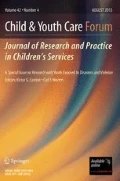Abstract
It has been demonstrated that children's attitudes toward the elderly are formulated early in life. The purpose of this study was to investigate whether intergenerational contact and familiarity with the elderly in a child care setting influences children's attitudes toward older people. The findings suggest that familiarity is more important than contact in terms of its influence on children's attitudes toward photographs of elderly women. Results are discussed in relation to the implications for intergenerational activities in early childhood programs.
Similar content being viewed by others
References
Bekker, L. D., & Taylor, C. (1966). Attitudes toward the aged in a multigenerational sample.Journal of Gerontology, 21 115–118.
Bell, K. & Powell, L. (1983, November).Intergenerational involvement in residential settings: The integration of child care centers in nursing homes. Paper presented at the Professional Symposium of the National Association of Social Workers, Washington, D.C.
Bengston, V. L. (1971). Inter-age perceptions and the generation gap.The Gerontologist, 11(4), 85–89.
Bennett, R. (1976). Can the young believe they'll get old? Attitudes of the young toward the old: A review of research.Personnel and Guidance Journal, 55(3), 136–139.
Block, H. (1984).Intergenerational education for preschool educators, and elderly involved with early childhood education centers in long-term care sites. Unpublished manuscript. Oakton Community College, Des Plaines, IL.
Chitwood, D., & Bigner, J. (1980). Young children's perceptions of old people.Home Economics Research Journal, 8(5), 369–374.
Dunkle, R., & Mikelthun, B. (1983). Intergenerational programming: An adopt-a-grandparent program in a retirement community. In P. Foster (Ed.),Activities and the “Well Elderly”, pp. 93–106. New York: Haworth Press.
Fillmer, H. T. (1984). Children's descriptions of and attitudes toward the elderly.Educational Gerontology, 10 99–107.
Hickey, T., & Kalish, R. (1968). Children's perceptions of the elderly.Journal of Genetic Psychology, 112 227–235.
Kermis, M. D. (1984).The Psychology of Human Aging. Newton, MA: Allyn & Bacon.
Lane, B. (1964). Attitudes of youth toward the aged.Journal of Marriage and the Family, 26 229–231.
McTavish, D. (1971). Perceptions of old people: A review of research methodologies and findings.The Gerontologist, 11(4), 90–101.
Mitchell, J., Wilson, Revicki, D. & Parker, L. (1985). Children's perceptions of aging: A multidimensional approach to differences by age, sex and race.The Gerontologist, 25(2), 182–187.
Murphy, M. B. (1984).A Guide to Intergenerational Programs. Washington, D.C.: National Association of State Units on Aging.
Peterson, W. A. (1971). Research priorities on perceptions and orientations toward aging and toward older people.The Gerontologist, 11(4), 60–63.
Rosencranz, H. A., & McNevin, T. E. (1969). A factor analysis of attitudes toward the aged.The Gerontologist, 9 55–59.
Seefeldt, C., Jantz, R., Galper, A., & Serock, K. (1977). Using pictures to explore children's attitudes toward the elderly.The Gerontologist, 17 506–511.
Seefeldt, C., Jantz, R., Serock, K., & Bredekamp, S. (1982). Elderly person's attitudes toward children.Educational Gerontology, 8 493–506.
Seltzer, M., & Atchley, R. (1971). The concept of old: Changing attitudes and stereotypes.The Gerontologist, 11(3), 226–230.
Serock, K., Seefeldt, C., Jantz, R., & Galper, A. (1977). As children see old folks.Today's Education, 70–73.
Sheehan, R. (1978).Young children's contact with the elderly.Journal of Gerontology, 33(4), 567–574.
Thomas, E. C., & Yamamoto, K. (1975). Attitudes toward age: An exploration of school age children.International Journal of Aging and Human Development, 6 (2), 117–129.
Author information
Authors and Affiliations
Additional information
The authors would like to express their appreciation to F. Scott Christopher and Scott Wright for their review of an earlier version of this manuscript.
Rights and permissions
About this article
Cite this article
Kocarnik, R.A., Ponzetti, J.J. The influence of intergenerational contact on child care participants' attitudes toward the elderly. Child Youth Care Forum 15, 244–250 (1986). https://doi.org/10.1007/BF01120216
Issue Date:
DOI: https://doi.org/10.1007/BF01120216




